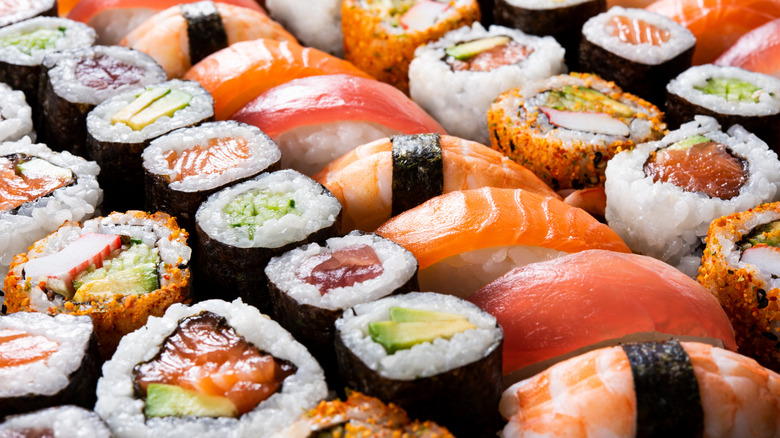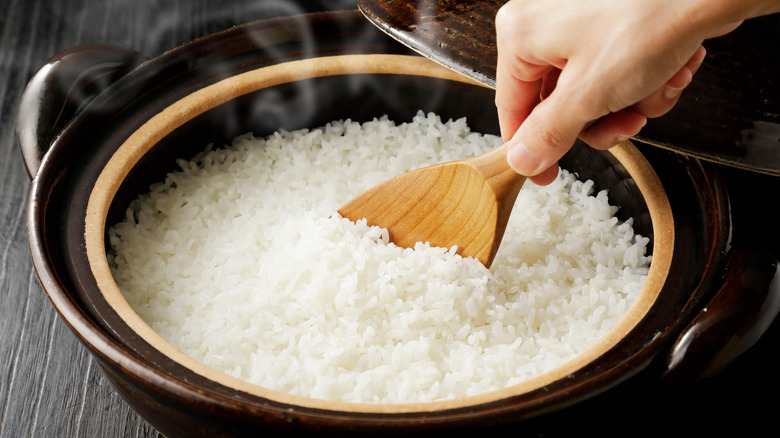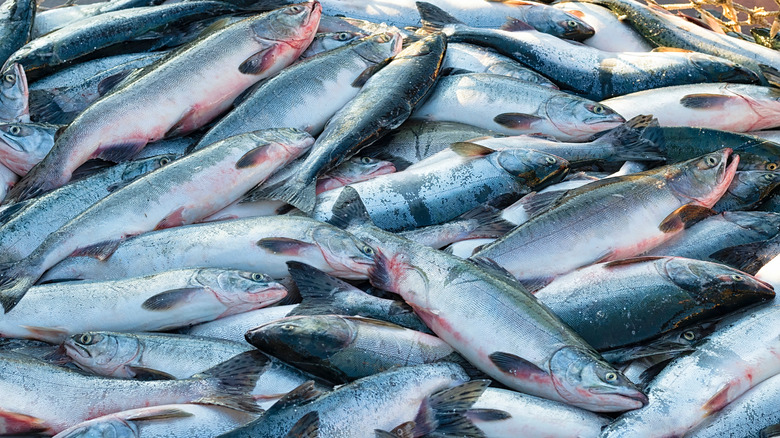How California's Drought Could Lead To A Sushi Shortage In The US
Sushi lovers should anticipate a higher tab on their next trip to the sushi counter or omakase spot, as severe weather conditions brought on by climate change have wreaked havoc on the industry's supply chain. According to Bloomberg, the most recent wave of critical water shortages in California has had a major impact on two key sushi-related industries, driving the price of the average roll up.
Sushi has become a massive industry in the United States; Mental Floss found that there are nearly 4,000 sushi restaurants across the country generating $2 billion annually as of 2017. However, with the vast majority of American-grown sushi rice coming from drought-riddled California, the nation's sushi industry is now facing a supply crisis.
Per Bloomberg, the west coast's recent high temperatures and water conditions have resulted in California restricting the amount of water available to farms — which use about 40% of the state's water in a typical year — and diverting water from rivers, which has severely impacted the local salmon industry. This combination has resulted in a one-two punch to California's already vulnerable fisheries and rice farms.
California's lowest rice crop in 30 years will mean higher sushi prices
According to the California Rice Commission, in an average year the state produces "virtually all of America's sushi rice," providing 25,000 jobs and $5 billion in profits to the state in the process. This year, water cuts to the state's farms have meant a reduction in the rice yield overall.
Speaking to Bloomberg, sixth-generation Sacramento Valley rice farmer Fritz Durst says that his farm, which has been harvesting the crop for more than 40 years, planted half as many acres of rice as in a typical year in response to water shortages. According to the U.S. Department of Agriculture, this year's overall California rice plantings are at their lowest in almost 30 years.
For sushi chefs and restaurant owners, this dip in the rice harvest translates to higher menu prices for their customers. According to Tony Gentile, a co-owner of 16 sushi bars across the country, menu prices have gone up at all of his restaurants to compensate for elevated ingredient and labor costs. His company, the Flagship Restaurant Group, has struggled to keep up with the ever-fluctuating market prices. "Prices now fluctuate day to day more than any other time that I can remember ... [in] more than 20 years. It's scary," Gentile tells Bloomberg.
The California salmon industry has also taken a hit
In order to aid farmers during the drought, Bloomberg notes that California has siphoned water from the Sacramento River to provide irrigation to local farms. While helpful for farmers, these efforts have posed a threat to the salmon industry.
The California salmon industry, which makes the state $900 million annually, has had to combat a combination of rising temperatures, lower water levels, and state-wide water siphoning. These factors have led to concerns that the young salmon in the river could be "cooked to death" after being released from hatcheries, Bloomberg reports. Traditionally, young salmon are released into the river in order to swim to the Pacific Ocean and grow to maturity. Now, the state has been forced to transport the fish by truck to cooler conditions until the water is deemed suitable.
Tensions between the farming and fishing industries in California is nothing new. The two have spent decades going head-to-head in court over water-rights disputes. However, with California's drought problem likely to intensify in the coming years, the state will have to make a long-term plan for how to distribute their already-limited resources.
As Jeanine Jones of the California Department of Water Resources told Bloomberg, "we should be shifting our focus from thinking about drought as an emergency that occurs once in a while, to thinking about it in the context of a long-term shift." For the average sushi consumer, this shift could mean paying a little extra for your favorite roll from here on out.


